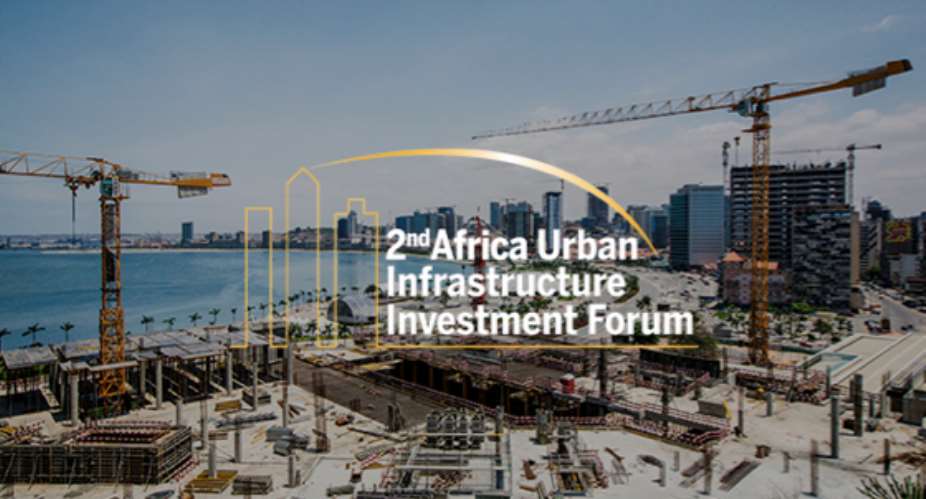LUANDA, Angola,1 May 2015 -/African Media Agency (AMA)/-The 2nd Urban Infrastructure Investment Forum (AUIFF) in Luanda saw a number of African ministers and leaders of cities gather to discuss a range of issues relating to the development of African cities and how to deal with rising urbanisation on the continent. Africa has 52 cities with over 1million people, which is similar to Europe. However Africa, where 40% of the population live in urban areas is not as urbanised as Asia, with 50% of urban dwellers or Latin America, with 60%.
In many of the presentations and panel discussions at the Forum, there was much talk of public private partnerships. This is because the public sector, that is government and local municipalities, simply don't have the funds to build all the necessary houses and provide all the services to this growing population. Some 4m housing units are needed in Africa every year for example.
However, the private sector present at the Luanda meeting highlighted the need for transparency, consistency and the right frameworks - if investment into infrastructure is going to take place. There is interest in investment in the power sector, for example, but as infrastructure investment is recouped over a 25-year or an even longer time frame, certainty over the rules and regulations, as well as competition rules need to be established and clear.
The opening ceremony was hosted by HE Manuel Domingos Vicente, Vice - President of Republic of Angola, with participation from local and international representatives from various sectors in over 20 countries. He said that over a decade ago, Angola's urban population consisted less than 50% of the total population. However, as a result of the Government's urbanisation initiative, numbers have increased exponentially, with 75% of the population now inhabiting the urban areas.
Angola's Minister for Urbanism and Habitat, Hon José António da Conceição e Silva, said that at the current rate of urban expansion "Africa will need to build 4 million new houses every year, in order to meet its demands".
Delivering his keynote address, HE Pedro Pires, Former President of Cape Verde, winner of the Mo Ibrahim Foundation African Leadership Prize and Honorary Member of the UCLG-A reiterated the need to address the causes for rural/urban migration in addition to creating cities that are dynamic, wealthy, safe and beautiful, and have the potential to generate employment.
Africa is the fastest urbanising continent in the world, but this migration needs to be controlled or else we will create some urban sprawls and slums, he concluded.
Jean Pierre Elong Mbassi, UCLG-A Secretary General stressed the urgent need to develop and implement urban infrastructure investment plans, with an emphasis on financing "in order to curb the current infrastructure backlogs and enhance the attractiveness and competitiveness of African cities". Meanwhile, Aisa Kacyira, UN Assistant Secretary General and Deputy Executive Director for UN-Habitat, highlighted the importance and strategic nature of AUIFF, saying that the Forum was essential in moving Africa towards to the development and empowerment of local economies.
Empowering cities also mean taking into consideration the needs of the people and the African culture and way of life, especially in terms of urban developments. The realities of our life, our living conditions are often not taken into consideration. For example, affordable housing units are often 'imported' with only 30% of the material used for these being local. Designers and planners therefore need to ensure that in the future, Africa makes use of its own resources and its own cultural way of life when designing and planning new developments and transformational plans.
The new "Kilamba" centrality in Luanda was showcased as one of Angola's most successful urban projects. Supported by the Angolan Government, which provided 100 thousands hectares for the development of 18 provinces, Kilamba now has 400 thousand affordable houses. Previously seen as a "white elephant", this centrality has now become a success story and a blueprint for others to replicate.
Property rights also remain among the most important issues affecting Africa's urbanisation. Dar es Salaam, in Tanzania, was presented as a successful case, where a high level of property registrations has helped to build social cohesion. However, regulating property ownership means effective communication and collaboration between property owners and local governments. AUIFF participants concluded that elsewhere in the world, property rights have resulted in wealth creation and have proven to be catalysts for transformation.
The Forum was organised by IC Events, the events division of IC Publications, publishers of African Business magazine. The next edition of the Forum will take place in Johannesburg in December.
Distributed by African Media Agency on behalf of Africa Urban Infrastructure Investment Forum (AUIIF).





 Saglemi Housing Project will not be left to rot – Kojo Oppong Nkrumah
Saglemi Housing Project will not be left to rot – Kojo Oppong Nkrumah
 Transport fares hike: GPRTU issue two-day ultimatum
Transport fares hike: GPRTU issue two-day ultimatum
 ARC endorses Alan as presidential candidate – Buaben Asamoa
ARC endorses Alan as presidential candidate – Buaben Asamoa
 Akufo-Addo appoints Kwasi Agyei as new Controller and Accountant-General
Akufo-Addo appoints Kwasi Agyei as new Controller and Accountant-General
 PNC dismiss reports of mass resignations
PNC dismiss reports of mass resignations
 PAC advocates for revenue collectors to be engaged on commission basis, not full...
PAC advocates for revenue collectors to be engaged on commission basis, not full...
 Genser Energy commissions 110km of natural gas pipeline at Anwomaso
Genser Energy commissions 110km of natural gas pipeline at Anwomaso
 Naa Torshie calls for tolerance, peace ahead of 2024 election
Naa Torshie calls for tolerance, peace ahead of 2024 election
 Asantehene commends Matthew Opoku Prempeh for conceiving GENSER Kumasi Pipeline ...
Asantehene commends Matthew Opoku Prempeh for conceiving GENSER Kumasi Pipeline ...
 Let’s do away with ‘slash and burn politics’ in Ghana — Dr Adutwum
Let’s do away with ‘slash and burn politics’ in Ghana — Dr Adutwum
